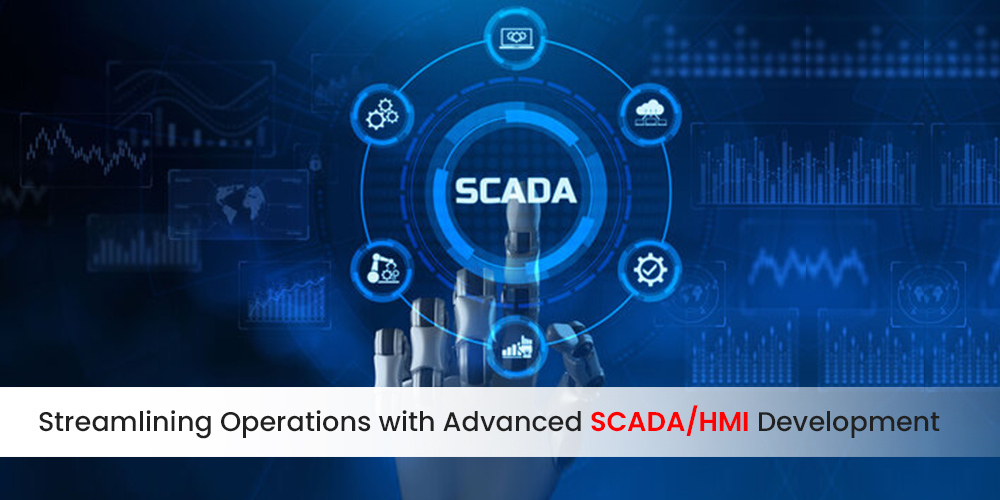Streamlining Operations with Advanced SCADA/HMI Development
- September 5, 2024
- Posted by: amol pharos
- Category: Uncategorized

In today’s competitive industrial landscape, businesses are constantly seeking ways to optimize operations and reduce costs. One effective approach to achieving these goals is through the implementation of advanced SCADA (Supervisory Control and Data Acquisition) and HMI (Human-Machine Interface) systems. These systems provide real-time monitoring and control of various processes, enhancing efficiency, productivity, and safety.
Understanding SCADA and HMI Systems
SCADA is a comprehensive system used to monitor and control industrial processes, such as manufacturing, power generation, water treatment, and more. It gathers data from sensors and instruments, enabling operators to make informed decisions based on real-time information.
HMI, on the other hand, acts as the user interface that allows human operators to interact with the SCADA system. It presents data in a visual format, often through graphical displays, making it easier for operators to understand complex data and take appropriate actions.
Together, SCADA and HMI systems provide a powerful combination that can significantly streamline operations.
Key Benefits of Advanced SCADA/HMI Development
- Enhanced Real-Time Monitoring and Control
Advanced SCADA/HMI systems offer real-time monitoring and control capabilities, allowing operators to view critical data from various parts of their operations instantly. This visibility enables faster decision-making, helping to address issues before they escalate into major problems. For example, in a manufacturing plant, operators can monitor production line performance and quickly identify any bottlenecks or faults. - Improved Data Management and Analysis
Modern SCADA systems are equipped with sophisticated data management tools that collect, store, and analyze large volumes of data. This data can be used to identify trends, optimize processes, and improve overall efficiency. By implementing an advanced SCADA/HMI solution, businesses can gain valuable insights into their operations, which can help reduce downtime, minimize waste, and increase productivity. - Remote Access and Control
With advancements in technology, SCADA/HMI systems now offer remote access capabilities. Operators can monitor and control processes from anywhere, whether on-site or off-site. This flexibility not only enhances operational efficiency but also reduces the need for constant on-site supervision, leading to cost savings. - Increased Operational Efficiency and Reduced Downtime
By providing real-time information and enabling predictive maintenance, advanced SCADA/HMI systems help in reducing unplanned downtime. Predictive maintenance strategies rely on data collected from various sensors to predict equipment failures before they happen. This proactive approach ensures that maintenance can be planned and scheduled without disrupting operations, thus improving overall efficiency. - Enhanced Safety and Compliance
Safety is a critical concern in industrial environments. Advanced SCADA/HMI systems help ensure compliance with safety regulations by providing accurate data and alarms for hazardous situations. Operators can quickly identify and address safety concerns, reducing the risk of accidents and ensuring that the plant meets all regulatory requirements.
Key Features of Advanced SCADA/HMI Systems
- User-Friendly Interface:
The interface should be intuitive and easy to navigate, reducing the learning curve for operators and enhancing overall productivity. This includes customizable dashboards, graphical representations, and touch-screen capabilities that make it easier to interact with the system. - Integration with Existing Systems:
Advanced SCADA/HMI systems should be able to integrate seamlessly with existing PLC (Programmable Logic Controller) and DCS (Distributed Control Systems). This integration enables smooth communication and data exchange between different components, improving overall system performance. - Scalability:
A scalable SCADA/HMI solution allows businesses to expand and upgrade their systems as needed without incurring significant costs. This is particularly important for growing companies that need to adapt to changing operational requirements. - Data Security:
As SCADA/HMI systems become more interconnected, the risk of cyber-attacks also increases. Therefore, implementing robust security measures, such as encryption, firewalls, and access controls, is essential to protect sensitive data and ensure the system’s integrity.
Best Practices for SCADA/HMI Development
- Define Clear Objectives:
Before starting the development process, it’s crucial to define clear objectives and understand the specific needs of your operations. This will help in designing a customized SCADA/HMI system that meets your unique requirements. - Involve Stakeholders:
Involving key stakeholders, including operators, IT personnel, and management, during the development phase ensures that the system is user-friendly and aligns with organizational goals. Regular feedback and collaboration can help avoid costly redesigns later. - Regular Maintenance and Updates:
Like any technology, SCADA/HMI systems require regular maintenance and updates to function optimally. Regular software updates, security patches, and system audits will help keep the system running smoothly and securely. - Training and Support:
Providing adequate training to operators and support staff is crucial for the successful implementation of SCADA/HMI systems. A well-trained team will be more confident in using the system effectively, leading to improved productivity and fewer errors.
Conclusion
Advanced SCADA/HMI development plays a vital role in streamlining industrial operations by providing real-time monitoring, data management, remote access, and enhanced safety features. By implementing a robust SCADA/HMI solution, businesses can improve efficiency, reduce downtime, and ensure compliance with safety regulations.
If you are looking to optimize your plant operations, consider investing in advanced SCADA/HMI systems. For more details on how these systems can benefit your business, visit iPAC Automation’s PLC and DCS System Implementation Services.
